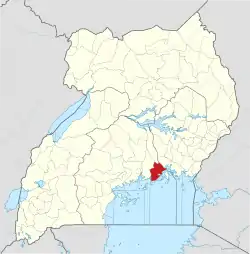Mabira Forest
The Mabira Forest is a rainforest area covering about 300 square kilometres (120 sq mi) (30,000 hectares (74,000 acres)) in Uganda, located in Buikwe District, between Lugazi and Jinja. It has been protected as Mabira Forest Reserve since 1932. It is home for many endangered species like the primate Lophocebus ugandae.
| Mabira Forest | |
|---|---|
| Mabira Central Forest Reserve | |
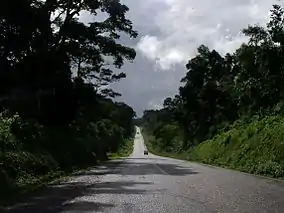 | |
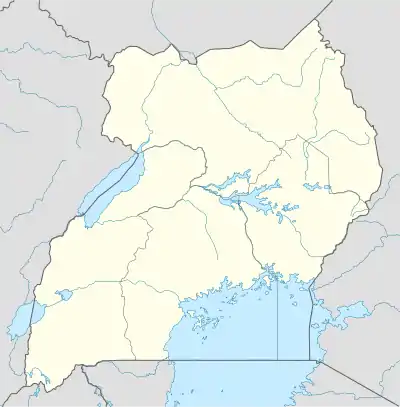 Location in Uganda | |
| Location | Mukono District, Central Region, Uganda |
| Nearest city | Lugazi |
| Coordinates | 0°23′54″N 33°0′59″E |
| Area | 300 km2 (120 sq mi) |
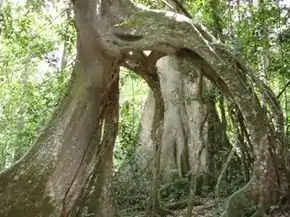
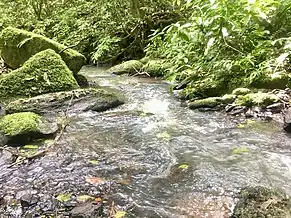
Geography
The Mabira forest lies north of Lake Victoria. The reserve covers an area of 30,038 ha. It lies on gently undulating country, with many flat-topped hills separated by wide stream valleys. Elevations range from 1070 to 1340 m above sea level. Although Lake Victoria lies close to the reserve's southern boundary, the forest is drained by streams that empty generally northward into the Victoria Nile.[1][2]
The forest reserve is surrounded by agricultural areas. The reserve completely or partially surrounds approximately 27 settled enclaves.[3][4]
Ecology
Mabira Forest is the largest remaining block of semi-evergreen rainforest in the Victoria Basin forest-savanna mosaic ecoregion. The reserve is secondary forest, and has been subject to long-term human influence. Logging began in the early 20th century, and the characteristic trees East African mahogany (Khaya anthotheca) and mvule (Milicia excelsa) that were present in the 1950s have been since mostly been cut down for their valuable timber. During the 1970s and 80s the government allowed banana and coffee plantations in the reserve.[5][6]
The reserve is home to 315 species of birds, 312 species of trees, 218 butterfly species, 97 moth species, 23 small mammal species.[7][8]
Mabira as a source of rubber
The Mabira forest was leased in 1900 by the East Africa and Uganda Exploration Company, who then set up the Mabira Forest (Uganda) Rubber Company to handle the concession. Their hopes of obtaining 500,000 lbs per annum from the forest proved unrealistic: the cost of clearing the dense forest around individual trees was too expensive, particularly on account of the poor yields which they got for each tree. As a result, the company moved from exploiting wild rubber to planting cultivated rubber, and also coffee.[9]
Deforestation plans
In 2007 the Sugar Corporation of Uganda Limited (SCOUL), a jointly owned by the Government of Uganda and by the Mehta Group, announced plans to clear one-third of the Mabira Forest (around 70 square kilometres (27 sq mi), for sugarcane plantations, and had proposed to the government to de-gazette this land and transfer it to SCOUL. President Yoweri Museveni and his cabinet supported this plan.[10]
The deforestation plans were disputed within Uganda. While environmental activists feared the loss of hundreds of endangered species, increased erosion, the damage of livelihoods of local people and negative impacts on water balance and regional climate, supporters hoped for the creation of jobs. A cabinet paper said the plan would generate 3,500 jobs and contribute USh 11.5 billion to the treasury.
The Kabaka (King) of Buganda opposed the deforestation plan and has offered alternative land for sugarcane production. The Anglican church of Mukono has also offered land.[11]
At least three people were killed during a demonstration of about 1,000 for the protection of the Mabira Forest. There were also riots against Asians, since the Mehta Group is Indian-owned. SCOUL plantations were set on fire, and e-mails and SMS calling for the boycott of SCOUL's Lugazi sugar circulated.
President Museveni defended the deforestation plans, saying that he shall ”not be deterred by people who don't see where the future of Africa lies”. According to him, the Save Mabira activists ”don't understand that the future of all countries lies in processing”. In May 2007, the Ugandan environmental minister announced that the deforestation plans were suspended and that the government is trying to find alternative land for the Mehta Group.
See also
Sources
- Protest against deforestation plans on EcoEarth.info
- BBC News: Deaths in Uganda forest protest
- BBC News: Uganda leader defends forest plan
- BBC News: Ugandan plan for forest suspended
- Save Mabira Petition
- BirdLife International (2020) Important Bird Areas factsheet: Mabira Forest Reserve. Accessed from http://www.birdlife.org on 19 March 2020.
- Remmy, Muwaza Andrew (2017). "A Report on the Field Visit in Mabira Central Forest Reserve on 28th October 2017" Makerere University, College of Agriculture and Environmental Sciences. Accessed 19 March 2020. <https://www.academia.edu/39924062/REPORT_ON_THE_FIELD_VISIT_IN_MABIRA_CENTRAL_FOREST_RESERVE>
- BirdLife International (2020) Important Bird Areas factsheet: Mabira Forest Reserve. Accessed from http://www.birdlife.org on 19 March 2020.
- Remmy, Muwaza Andrew (2017). "A Report on the Field Visit in Mabira Central Forest Reserve on 28th October 2017" Makerere University, College of Agriculture and Environmental Sciences. Accessed 19 March 2020. <https://www.academia.edu/39924062/REPORT_ON_THE_FIELD_VISIT_IN_MABIRA_CENTRAL_FOREST_RESERVE>
- BirdLife International (2020) Important Bird Areas factsheet: Mabira Forest Reserve. Accessed from http://www.birdlife.org on 19 March 2020.
- Remmy, Muwaza Andrew (2017). "A Report on the Field Visit in Mabira Central Forest Reserve on 28th October 2017" Makerere University, College of Agriculture and Environmental Sciences. Accessed 19 March 2020. <https://www.academia.edu/39924062/REPORT_ON_THE_FIELD_VISIT_IN_MABIRA_CENTRAL_FOREST_RESERVE>
- "Mabira Central Forest Reserve". www.nfa.go.ug. Retrieved 2023-05-17.
- BirdLife International (2008) "Campaign to save Mabira Forest in Uganda from sugarcane plantation for biofuels". Accessed from http://www.birdlife.org on 19 March 2020.<http://datazone.birdlife.org/sowb/casestudy/campaign-to-save-mabira-forest-in-uganda-from-sugarcane-plantation-for-biofuels>
- Pitman, C. R. S. (January 1934). "The Mabira Foreat". The Uganda Journal. 1 (1): 7–16.
- "Executive order No3: Museveni bans charcoal trade, guides on the Balaalo". Monitor. 2023-05-25. Retrieved 2023-05-29.
- New Vision: Kabaka Blocks Mabira Plans Archived 2007-06-08 at the Wayback Machine
- "Mabira: A forest under encroachment". Monitor. 2021-02-01. Retrieved 2022-05-25.
- Reporter, Independent (2020-10-13). "YY bus crashes in Mabira forest, injures 17". The Independent Uganda. Retrieved 2022-05-25.

